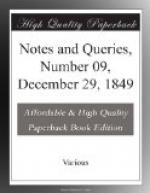OUR PROGRESS
We have this week been called upon to take a step which neither our best friends nor our own hopes could have anticipated. Having failed in our endeavours to supply by other means the increasing demand for complete sets of our “Notes and queries,” we have been compelled to reprint the first four numbers.
It is with no slight feelings of pride and satisfaction that we record the fact of a large impression of a work like the present not having been sufficient to meet the demand,—a work devoted not to the witcheries of poetry or to the charms of romance, but to the illustration of matters of graver import, such as obscure points of national history, doubtful questions of literature and bibliography, the discussion of questionable etymologies, and the elucidation of old world customs and observances.
What Mr. Kemble lately said so well with reference to archaeology, our experience justifies us in applying to other literary inquiries:—
“On every side there is evidence of a generous and earnest co-operation among those who have devoted themselves to special pursuits; and not only does this tend of itself to widen the general basis, but it supplies the individual thinker with an ever widening foundation for his own special study.”
And whence arises this “earnest co-operation?” Is it too much to hope that it springs from an increased reverence for the Truth, from an intenser craving after a knowledge of it—whether such Truth regards an event on which a throne depended, or the etymology of some household word now familiar only to
“Hard-handed men who work in Athens here?”
We feel that the kind and earnest men who honour our “Notes and queries” with their correspondence, hold with Bacon, that
“Truth, which only doth judge itself, teacheth that the inquiry of Truth, which is the love-making or wooing of it—the knowledge of Truth, which is the presence of it—and the belief of Truth, which is the enjoying of it—is the sovereign good of human nature.”
We believe that it is under the impulse of such feelings that they have flocked to our columns—that the sentiment has found its echo in the breast of the public, and hence that success which has attended our humble efforts. The cause is so great, that we may well be pardoned if we boast that we have had both hand and heart in it. {130}
And so, with all the earnestness and heartiness which befit this happy season, when
“No spirit stirs abroad;
The nights are wholesome; when no planet
strikes,
No fairy takes, no witch hath power to
charm,
So hallow’d and so gracious is the
time,”
do we greet all our friends, whether contributors or readers, with the good old English wish,
A Merry Christmas and A happy new year!




